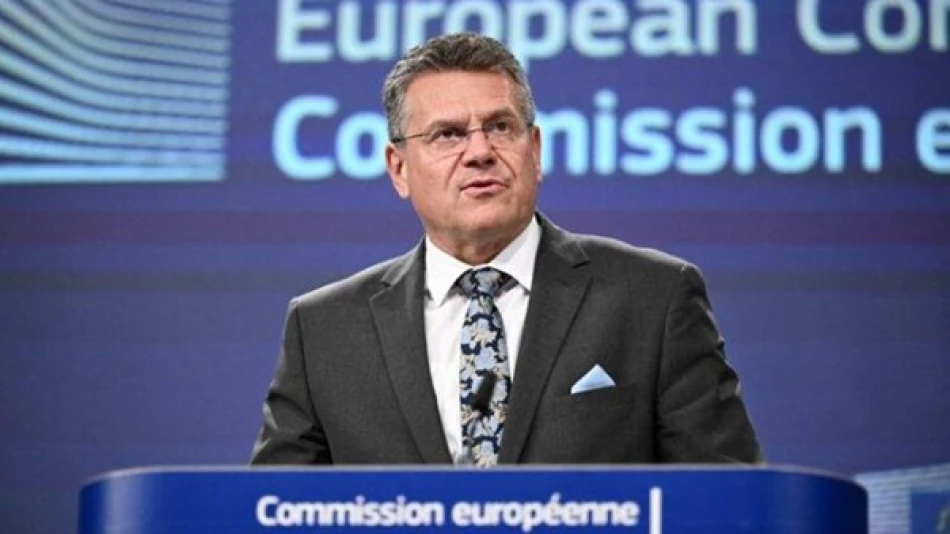
Brussels Negotiates Trade Disputes with Washington, Seeking Amicable Resolution
EU Prepares Trade War Arsenal While Pursuing Diplomatic Solution with Trump Administration
The European Commission signaled Wednesday it remains committed to negotiating a trade deal with the United States while simultaneously preparing retaliatory measures should talks collapse. The dual-track approach reflects Brussels' cautious optimism amid heightened trade tensions with the incoming Trump administration, which has threatened sweeping tariffs on European goods.
High-Stakes Meeting Sets Stage for Trade Relations
European Trade Commissioner Maroš Šefčovič is scheduled to meet with U.S. Commerce Secretary Howard Lutnick later today in what could prove pivotal for transatlantic trade relations. The timing is critical, as President-elect Trump has already signaled his intention to revive the aggressive trade policies that defined his first term.
The Commission's statement emphasized that "while negotiations remain our priority, we continue preparing for all scenarios, including taking additional countermeasures if necessary." This language suggests Europe has learned from the 2018-2019 trade war, when Trump's steel and aluminum tariffs caught many European officials off-guard.
Europe's Strategic Shift from Past Trade Conflicts
Unlike the previous Trump presidency, when Europe initially pursued a largely defensive strategy, the EU now appears to be taking a more proactive stance. The bloc has spent the past four years diversifying its trade relationships, strengthening ties with Asia-Pacific partners, and building a more robust legal framework for trade disputes.
Lessons from the First Trade War
During Trump's first term, the EU imposed retaliatory tariffs on $3.2 billion worth of American products, targeting politically sensitive items like Harley-Davidson motorcycles, bourbon whiskey, and jeans. These measures were designed to pressure key Republican constituencies, a strategy that ultimately contributed to a temporary truce.
However, the current situation differs significantly. Europe's economy is more fragile following years of energy crises and inflation, while the U.S. has become increasingly focused on reshoring manufacturing and reducing dependence on foreign supply chains.
Market Implications and Investor Concerns
Financial markets have already begun pricing in potential trade disruptions. European exporters, particularly in the automotive and luxury goods sectors, face heightened uncertainty as investors weigh the likelihood of new tariff barriers. German automakers like BMW and Mercedes-Benz, which export significant volumes to the U.S. market, could see their profit margins compressed if negotiations fail.
The euro has weakened against the dollar in recent weeks, partly reflecting concerns about potential trade conflicts. Currency traders are closely watching today's meeting for signals about whether both sides can find common ground or whether a more confrontational approach is inevitable.
Global Trade Architecture at a Crossroads
The EU-U.S. negotiations occur against a backdrop of broader shifts in global trade patterns. China's growing economic influence, the rise of regional trade blocs, and increasing emphasis on supply chain resilience have fundamentally altered the landscape since Trump's first presidency.
Europe's approach reflects a broader recognition that the old model of multilateral trade agreements may be giving way to more bilateral, transactional relationships. The EU's recent trade deals with Canada, Japan, and Mercosur demonstrate Brussels' commitment to maintaining open markets even as protectionist sentiment grows in other major economies.
The Stakes for Global Commerce
A successful EU-U.S. agreement could provide a template for managing trade relationships in an increasingly fragmented global economy. Conversely, a breakdown in talks could accelerate the trend toward trade blocs and economic nationalism, potentially undermining the multilateral trading system that has underpinned global growth for decades.
Today's meeting between Šefčovič and Lutnick will likely determine whether pragmatic cooperation or strategic competition defines the next chapter of transatlantic economic relations.
Most Viewed News

 Layla Al Mansoori
Layla Al Mansoori






